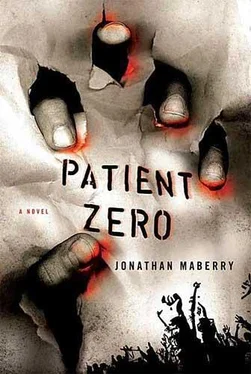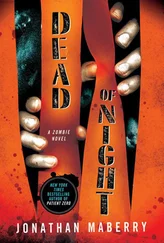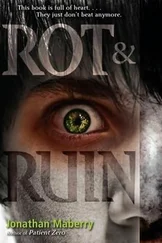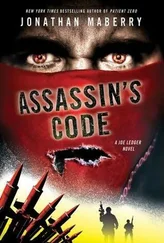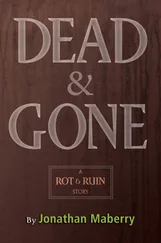“Go on.” Now Church’s smile seemed genuine.
“So… has anyone thought that instead of this being the start of the Terrorist Mighty Marching Society, it’s more like a kind of whaddya call it? A brain trust?”
“Keep going,” I said.
“Maybe someone—maybe the sick fuck who cooked up this prion bullshit—kinda had a great idea but needed an A-team to make it work. Not your run-of-the-mill fanatics but guys with real brain cells. The report from Dr. Hu says that this is—how’d he put it?—‘radically advanced’ technology. So somehow our bad guy puts the word out that he’s recruiting top of the line only.”
“I don’t buy it,” said Ollie.
“Me, neither,” agreed Top Sims. “That’d be in the wind, too. We’d have heard something. No, this smart sumbitch has a pipeline into the terrorist community and he’s directly recruiting. One to one. It’d be safer that way.”
“Sure,” Ollie agreed. “Easier to keep it all on the down-low.”
“But that brings up another problem,” said Bunny, but then he shook his head. “No, maybe a lead. If he’s recruiting outside of his own group then you got to figure there’s going to be a percentage of times he’s going to get turned down. Not everyone’s going to want to play that kind of baseball. If this guy is as smart as he seems to be, then he wouldn’t let anyone just stroll off who has even a whiff of what he’s doing.”
Skip snapped his fingers. “Right! We should check international records to see if any terrorists with known skills in high-end weapons or medicine have gone off the board. This guy would probably kill anyone who doesn’t sign with his team.”
Church turned to me. “Your team seems to be able to read your mind.” To the men he said, “Captain Ledger had the same thought and as a result I’ve initiated just such a database search. At his suggestion we’ve also begun searching for nonterrorist-affiliated scientists in the appropriate fields who may have disappeared, or whose family members are conspicuously missing.”
“Scientists might take all sorts of radical research risks if their wife or daughter were sitting somewhere with a gun to their heads,” Top agreed. “My kids were in that kind of danger, there’s nothing I wouldn’t do.” I saw a shadow pass over his face and remembered that he’d buried his son and saw his daughter crippled for life because of this war.
I said, “Okay, tell us why our mystery man is searching so far out of his own group.”
Bunny was about to speak but Ollie got there first. “ ’Cause even in a large group or small country you’re not going to have enough top minds in the right fields who are also extremists willing to die for their cause.”
“Right,” Skip said.
Top nodded. “Yeah, that’s too much to ask, and it’s too shallow a fishing hole. You need to pick and choose; you need to find the right guys—smart as a motherfucker and willing to die. That’s got to be a small club even worldwide.”
“What I’m saying,” Bunny agreed, nodding. “This stuff is slick. Really slick.” He sipped some coffee from a metal travel mug and looked at Church and me over the rim. “No one at Homeland thought of that?”
“Red tape and too many levels of bureaucracy can impede practical thought,” Church said.
“Which is a nice way of saying they have their thumbs up their asses,” Ollie interpreted.
Church said nothing, but he didn’t appear to disagree.
Top narrowed his eyes and looked appraisingly at Church. “Sir… I pretty much know why you picked us. And those science geeks you got on our team? I’m gonna guess there’s not one of them that ever scored second best in the school science fair.”
Church smiled.
“So what we have here,” Skip said, “is an all-star squad.”
Ollie grinned. “Okay, so they got a geek squad and the DMS has a geek squad. But you also got a crew of first-team shooters. Who do they have?”
I said, “Javad Mustapha—one player on their team—started an outbreak that wiped out two DMS teams and over two hundred civilians. You saw firsthand what the walkers did to those kids and to the guards and lab techs in Delaware; and you know what happened in Room Twelve. We have shooters, they have walkers.”
That shut everyone up for a while and we sat there in the belly of the chopper as it tore through the Maryland skies.
“Surprise was a big factor in the loss at the hospital. Same goes for what happened last night,” I said. “What are the chances that any of us are going to be surprised if we run into a walker at the crab plant?”
Bunny snorted. “If it moans and moves I’m gonna kill it.”
“Hooah.” They all said it together.
“And if there are a lot of them?” Church asked.
“I killed me a bunch of walkers in Delaware, sir,” said Top, “and I was in a good mood. After Room Twelve I’m a mite pissed off.”
“Fucking-A,” Skip agreed.
“Fine,” Church said, “but here’s the thing. Echo Team is going into the plant for a look-no-touch. As you rightly put it, our intel is weak. The mission objective is to get more information because we got virtually nothing of worth from Delaware. If it looks like a pull-back-and-rethink then that’s what we’ll do. We have the option to upgrade into an assault but there are some operational priorities which include securing undamaged computers and drives, and apprehending suspects. If you have to pull triggers then try—and I mean really try—to bring me back someone with a pulse.”
Skip said, “I thought that these clowns die after six, eight hours unless they take a pill. How you going to sweat info out of them with that kind of deadline?”
Mr. Church’s face was stone. “My copy of the Geneva Convention got burned up in a fire. I won’t need six hours.”
They were four very tough men and every one of them was scared silent by the uncompromising tone of his voice. After a moment Ollie cleared his throat. “What do we do if we run into armed resistance?”
“If you draw fire you return fire. This is not a suicide mission, Lieutenant Brown. I’ve already buried too many of my people in the last week.” He paused to make sure everyone was giving him every bit of their attention. “You will try to accomplish the mission objectives in priority order, but you do what you have to do to come back alive.”
“Okay,” I said, “eyes on the map. The crab processing plant is located on the Chesapeake Bay off Tangier Sound. The southwest side of the building fronts the Pocomoke River eight hundred yards from where the river spills out into the bay. There’s a wooden dock where crab boats tie up. The rest of the property is a U-shaped parking lot. Lots of open ground.”
Ollie tapped the map. “Almost no cover. If they have cameras with night vision we’d be chopped to pieces. We’ll need some kind of diversion or another route in.”
“I have something in mind,” I said. “The building is one story, flat, and about fifty-five thousand square feet. Before it was used for seafood it was a boat storage warehouse, but has since been converted. We know from the building inspector’s report from this past January that the northeast corner is used for offices and bulk storage—empty containers, labels, rolls of plastic wrap, that sort of thing. The rest is the actual plant.”
“They still processing crabs in there?” Skip asked.
“Negative. The place is in receivership. The original staff was laid off on February fifteenth.”
“So, okay, if this place is closed then why are there, what… eight, nine vehicles in the lot?”
“That’s one of those things we don’t know,” I said. “Under ordinary circumstances I would presume that they’re there to oversee the company’s reorganization; but these three trucks here are all of the same make and model as the one followed to the crab plant by the task force.”
Читать дальше
